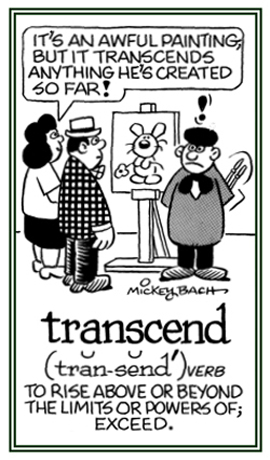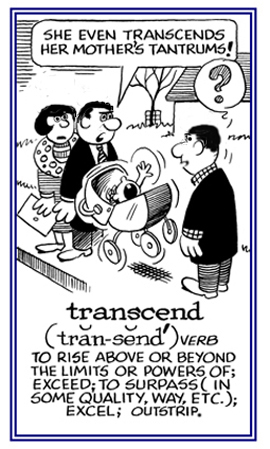scend-, scen-, scand-, scan-, scans-
(Latin: to climb; to mount; by extension, a ladder)
scandalize (verb), scandalizes; scandalized; scandalizing
1. To shock someone, or other people, by outrageous or improper behavior: The adulterous affair of the governor was scandalizing his political career.
2. To insult, tp slight, or to give offense by doing something immoral or illegal: Jack's mother was scandalized by his bad behavior.
2. To insult, tp slight, or to give offense by doing something immoral or illegal: Jack's mother was scandalized by his bad behavior.
A person who spreads information about shameful activities or events that disgrace people or which shocks those who hear about such behavior: There are some scandalmongers who go out of their way to find and then to publish evil gossip or slanderous accusations; especially, about those who are well-known to the public.

© ALL rights are reserved.
Go to this Word A Day Revisited Index

Go to this Word A Day Revisited Index
so you can see more of Mickey Bach's cartoons.
scandalous (adjective), more scandalous, most scandalous
1. Referring to something which is thought to be shocking and immoral: Jim’s grandmother was described as very scandalous because she married eight times, and each time to a much younger man, and each one more youthful than the one before!
2. Descriptive of a condition which is condemnable or shameful resulting typically from a person’s irresponsibility: One teacher in the elementary school, who had used the copying machine, produced an extravagant and scandalous waste of paper which was found in the wastepaper basket the next day.
2. Descriptive of a condition which is condemnable or shameful resulting typically from a person’s irresponsibility: One teacher in the elementary school, who had used the copying machine, produced an extravagant and scandalous waste of paper which was found in the wastepaper basket the next day.
scandent (adjective), more scandent, most scandent
Usually a reference to plants that have a tendency to climb with tendrils or twirling around other structures: The “mile-a-minute” vine and clematis are excellent examples of scandent vegetation which can grow profusely upwards on a support in the garden.
The analysis of poetic verse into metrical patterns: Mrs. Smart had to read through the scansions of her students’ essays, which showed the rhythmic components of the literary compositions which they had to analyse in her English class.
scansorial (adjective), more scansorial, most scansorial
Characterized by being adapted to climbing: Squirrels are scansorial creatures that are very skillful in going up the trunks of trees.
A motor-driven probe with an automatic recording device, producing an image on paper or on x-ray film: The scintiscanner is usually interfaced with a computer that processes the data to give more informative reading.
1. A false and malicious statement that damages someone's reputation: The mayor was a target of political slander when he was running for office.
2. An abusive attack on a person's character or good name: The public has heard countless unsupported slanders about the movie star.
3. A false vilification in some form, as in words, gestures, or actions: The lawyer listened to Mrs. White who was accused of slander because she made malicious statements about her employer.
2. An abusive attack on a person's character or good name: The public has heard countless unsupported slanders about the movie star.
3. A false vilification in some form, as in words, gestures, or actions: The lawyer listened to Mrs. White who was accused of slander because she made malicious statements about her employer.
slander (verb), slanders; slandered; slandering
1. To make false and vindictive reports, comments, or statements, that damage someone's good name or well-being: In school Susan slandered Mike by saying that he copied from his neighbor on the final exam even though he did not do it!
2. Etymology: from the late 13th century, from Anglo-French esclaundre, Old French esclandre, "scandalous statement", an alteration of escandle, "scandal"; from Latin scandalum, "cause of offense, stumbling block, temptation".
2. Etymology: from the late 13th century, from Anglo-French esclaundre, Old French esclandre, "scandalous statement", an alteration of escandle, "scandal"; from Latin scandalum, "cause of offense, stumbling block, temptation".
slanderous (adjective), more slanderous, most slanderous
A reference to false comments that are spoken, or written statements, that cause people to have a bad opinion about someone: There were so many slanderous allegations regarding Sue's honesty that she was forced to give up her position with the bank.
transcend (verb), transcends; transcended; transcending
1. To go beyond the powers or limits of; to exceed: The functions of the new computer transcended, or exceeded, Ted's expectations.
2. To be higher or greater than; to surpass; to excel; to be superior or extraordinary: When Jim told his mother that he had received a grade of "A" in all of his university classes, he transcended what she had anticipated he would achieve.
3. Etymology: from Latin transcendere from trans-, "beyond" + scandere, "to climb".

© ALL rights are reserved.

© ALL rights are reserved.
Go to this Word A Day Revisited Index
2. To be higher or greater than; to surpass; to excel; to be superior or extraordinary: When Jim told his mother that he had received a grade of "A" in all of his university classes, he transcended what she had anticipated he would achieve.
3. Etymology: from Latin transcendere from trans-, "beyond" + scandere, "to climb".


Go to this Word A Day Revisited Index
so you can see more of Mickey Bach's cartoons.
1. The state of being beyond the range of normal perceptions: The absolute transcendence of God is totally matchless and supreme over worldly life and possessions.
2. An existence or experience beyond the ordinary or physical condition: The state of transcendence is the quality of being beyond the normal range of material needs, like enjoying a fantastic concert and forgetting completely about everyday life.
2. An existence or experience beyond the ordinary or physical condition: The state of transcendence is the quality of being beyond the normal range of material needs, like enjoying a fantastic concert and forgetting completely about everyday life.
A condition of being or a reality of life above and beyond the limits of material experiences: Henrietta had a dream of an existence without problems, disagreements, dilemmas, and with perfect health; but this wish for transcendency was not part of her real world!
transcendent (adjective), more transcendent, most transcendent
1. A reference to going beyond ordinary life: Shirley wanted to see for herself the transcendent beauty of the mountains.
2. Relating to something which exceeds the limits of human understanding or knowledge: Little Jenifer read a book telling about fairies living in a transcendent world of their own, completely different than the one she was experiencing with her parents.
2. Relating to something which exceeds the limits of human understanding or knowledge: Little Jenifer read a book telling about fairies living in a transcendent world of their own, completely different than the one she was experiencing with her parents.
transcendental (adjective), more transcendental, most transcendental
Relating to the explanation of material things with thoughts and spiritual concepts because they are considered to be more of a reality than ordinary human experiences: Ted appeared to have some supernatural or transcendental ideas that explained what would happen if certain procedures were followed by the company's managers.

© ALL rights are reserved.
Go to this Word A Day Revisited Index



